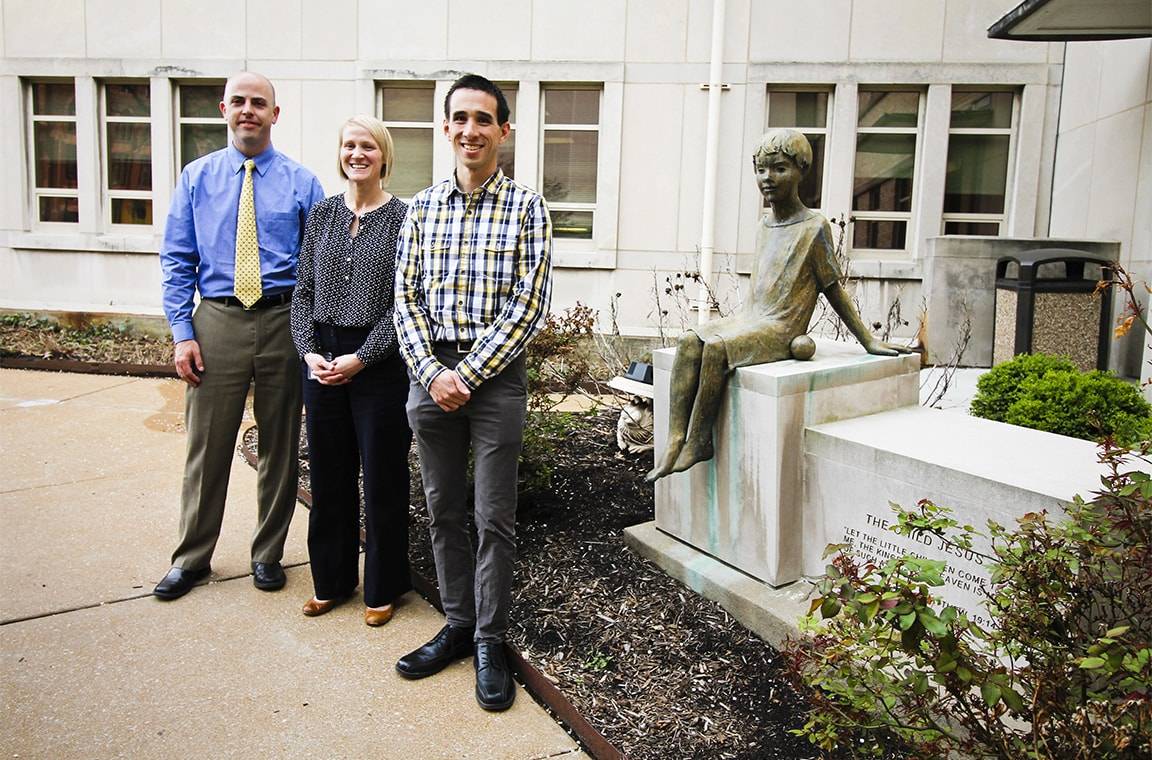SLU Researchers Finding Better Ways to Screen for Food Insecurity
The SLU Health Sciences Collaborative Research Institute Fosters Research Across Med Side of Campus
One in five households with children in the United States experience food insecurity - not having enough food each week or not knowing where the next meal will come from.
In the summer of 2015, an assessment survey of patients at Danis Pediatric Center at SSM Health Cardinal Glennon Children's Hospital found that 57 percent of caregivers had some level of household food insecurity. Now, three Saint Louis University researchers are using a SLU Health Sciences Collaborative Research Institute grant to look at solutions from both a pediatric physician perspective and a public health view.
The SLU Health Sciences Collaborative Research Institute grants provide health science researchers from various disciplines seed money for research projects.
Ellen Barnidge, Ph.D., MPH, an assistant professor in behavioral science and health education in the College for Public Health and Social Justice, is working with Gene LaBarge, M.D. and Josh Arthur, M.D., both assistant professors of pediatrics in the School of Medicine on "Food Insecurity Screening in Pediatric Clinical Settings: a Caregivers' Perspective."
The small grant program was created to foster collaboration between faculty from the schools of medicine and nursing, College for Public Health and Social Justice, Doisy College of Health Sciences and the Center for Outcomes Research.
Arthur and LaBarge have been working with low-income children and families for years in their roles as SLUCare pediatricians at Cardinal Glennon. Barnidge has been working at the community level on interventions to increase fruit and vegetable consumption.
"Throughout the years parents have told me and my colleagues that while eating more fruits and vegetables is ideal, feeding their families consistently is the most important thing," Barnidge said. "Making sure that families have access to consistent, affordable, healthy options is what food security is."
Children who live in food insecure households have more cognitive, emotional and physical health challenges throughout their life and face a greater risk of multiple chronic diseases, including obesity. Recent recommendations from the American Academy of Pediatrics suggest that pediatric clinical settings may create optimal screening opportunities for the identification of household food insecurity.
LaBarge and Barnidge began looking into a collaboration around food insecurity in 2015. Around the same time, Arthur joined the School of Medicine faculty as director of the Community Advocacy through Resident Education (CARE) Program. He also was interested in addressing food insecurity among families served at the Danis Pediatrics Center.
"It was the right timing for the right topic," said Arthur.
In the summer of 2015 the trio conducted two surveys -- the first for caregivers of DP patients to assess household food insecurity in the patient population and a second for physicians to assess their readiness to address food insecurity in the clinical visit.
The caregiver survey found that those caregivers who reported food insecurity also were more likely to report being uncomfortable talking with a doctor or nurse about their households' food needs.
"This grant will allow us to conduct interviews with patients' caregivers to understand how we might develop a food insecurity screening process that takes into account the needs of caregivers," said Barnidge. "For example, it is difficult to talk about a child in your care not having enough food to eat. How can we make that experience more comfortable? The micro-grant is allowing us to further our work as a collaborative team and allowing us with funds to engage caregivers about food insecurity."
The trio says each team member brings unique strengths to their collaboration, with LaBarge and Arthur providing perspective on the patient/clinician relationship and an understanding of what is feasible given clinic flow. Barnidge adds her skills in community-based research and grant writing.
"We are building trust and making sure each step of the way that the work we are doing will benefit patients," said LaBarge.
The ultimate goal is to see families that need food can get it consistently.
"A clinic to community integration model is one that connects what happens in the clinic experience with resources that already exist in the community," said Barnidge. "Given that many zip codes in St. Louis are designated as food deserts, connecting with food resources is not always easy for families with small children."
The SLU Health Sciences Collaborative Research Institute will hold a networking event for faculty who are interested in research from 5 to 7 p.m. Wednesday, April 13, in the Allied Health multi-purpose room. Faculty from the schools of medicine and nursing, College for Public Health and Social Justice, Doisy College of Health Sciences and Center for Outcomes Research comprise the research collective.
Established in 1836, Saint Louis University School of Medicine has the distinction of awarding the first medical degree west of the Mississippi River. The school educates physicians and biomedical scientists, conducts medical research, and provides health care on a local, national and international level. Research at the school seeks new cures and treatments in five key areas: infectious disease, liver disease, cancer, heart/lung disease, and aging and brain disorders.
The Saint Louis University College for Public Health and Social Justice is the only academic unit of its kind among the nearly 250 Catholic institutions of higher education in the United States. With a focus on finding innovative and collaborative solutions for complex global health problems, the College offers nationally recognized programs in global public health, social work, health management and health policy, epidemiology, biostatistics, environmental and occupational health, behavioral science and health education, emergency management, biosecurity and disaster preparedness, and criminology and criminal justice.


















